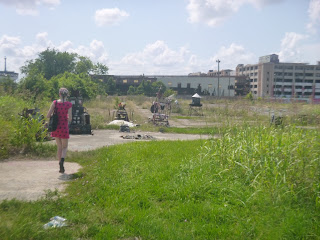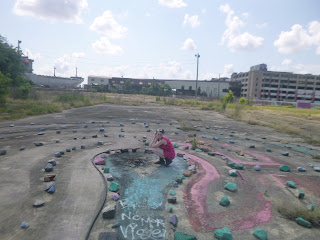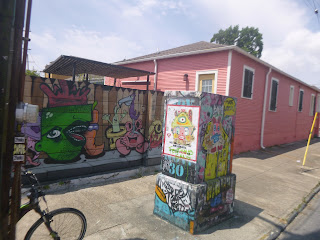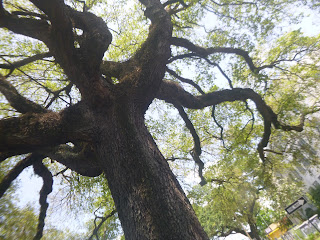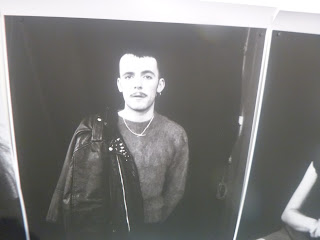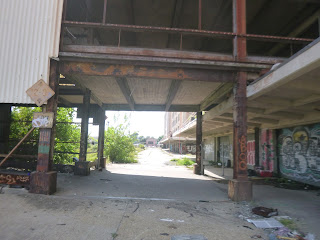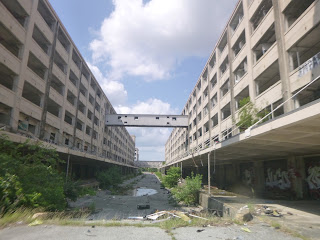Reflections on Entanglement and the End of School, Interconnection and Social Change
Grades turned in, another year, another grading program, that doesn’t quite get the numbers right at the college. In its little way, our journey through technology which creates more headaches, reminds me of why the philosophers have long looked to the steps between advancements and setbacks with skepticism, regarding notions of progress.
“What nonsense, this intoxicating notion of progress, of upward movement, that I had cherished, for now the moment of collapse was at hand,” writes Simone de Beauvoir in A Woman Destroyed", her 1969 novel about crumbling relationships.
Despite the glitches, the conversations this year were some of the best I’ve had in two decades of teaching. Trying times create new contexts for exploring and imagining, new reasons for dreaming; “We Must Start Dreaming Again” Jose-Eduardo-Agualusa puts it.
When I first started teaching, new faculty were required to take countless workshops on pedagogy. Try and create a conversation, I learned.
These days, I walk in and address a few questions students have left me from the week before, posting a powerpoint with a few quotations from readings, select homework replies, all of us responding, in a back-and-forth exchange of questions and answers, exploring multiple stories, some from novels, others from case narratives.
Others classes, I open with a question.
How does change happen?
We talk it out.
“Theory…” writes Edward Said, “is won as result of a process that begins when consciousness first experiences its own terrible ossification in the general reification of all things under capitalism; then when consciousness generalized (or classes) itself as something opposed to other objects and feels itself as contradiction to (or crisis within) objectification, there emerges a consciousness of change in the status quo, finally, moving toward freedom and fulfillment…”
In other words, shits fucked up and bullshit, as the kids said in Occupy Wall Street.
Everyone comes to it in their own way.
We unpack the quote, line by line.
Students usually have better answers.
“There can be no love without justice, and there can be no justice without memory” one posts, quoting from bell hooks’ Belonging: A Culture of Place, and its challenge to a politics of amnesia. “True resistance begins with people confronting pain… and wanting to do something to change it,” says hooks, later in the book, (p. 197).
What is the contradiction, I ask.
Several students respond:
"Better sleep with a sober cannibal than a drunken Christian,"
says Herman Melville in Moby Dick.
Many of us have been entranced with this story of wanderlust into a vast unknown lost in the horizon. “As for me, I am tormented with an everlasting itch for things remote.
I love to sail forbidden seas, and land on barbarous coasts,”
Melville begins the story of a voyage into a place where capitalism and extraction must contend with a natural world with its own logic. Who will win, the sailors or the whale?
Each class, we explore different ways of thinking about this moment we are in, as we navigate our lives in an interconnected, entangled world. These conversations follow me throughout the week, making my way across the city, biking from Brooklyn to Judson. The modern word excerpted from Meeting the Universe Halfway: Quantum Physics and the Entanglement of Matter and Meaning by Karen Barad, “The very nature of materiality is an entanglement. Matter itself is always already open to, or rather entangled with, the ‘Other.’ The intra-actively emergent ‘parts’ of phenomena are constituted. Not only subjects but also objects are permeated through and through with their entangled kin; the other is not just in one's skin, but in one's bones, in one's belly, in one's heart, in one's nucleus, in one's past and future. This is as true for electrons as it is for brittlestars as it is for the differentially constituted human…Ethics is therefore not about right response to a radically exteriorized other, but about responsibility and accountability for the lively relationalities of becoming of which we are a part.”
We’re all entangled in the other, in Whitman like, I am you and you are me, interconnected human experience.
Back at school, we kept talking about questions of entanglement, interconnection, and intersectionality. I first explored the term entanglement in Berlin. My professor Fabio Santos used it in his study of the French Borderlands of Brazil. For Santos, the French Borderland is “A study that challenges the coloniality of memory, this volume shows how the borderland along and across the Oyapock River, far from being the hinterland of France and Brazil, in fact illuminates entangled histories and their concomitant inequalities.” This was an example of an entangled inequality.
Elaborating, we thought about the detours, of the sort Melville and hooks describe, that migrants and travelers understand well, the sorts Stuart Hall refers to, extrapolating on the relationship
between identity & dislocation. For Hall, “The construction of gender and nation are entangled with each other, narratives of which are told and retold in national histories, literature,
the media and popular culture providing
a set of stories, images, landscapes,
events, national symbols, and rituals.”
In other words, culture matters. Whitman matters.
Last day of class, we snapped class pics, completed exams and presentations. We carry a lot of weight together through weekly reflection logs and homeworks. Some of these students have been with me through field practicum, trauma informed practice, group work, sex research, policy and intersectionality. Everyone conducted literature reviews or a character analysis of an activist, someone they interviewed, or read about. One student gave a presentation on Kalief Browder, who killed himself after leaving jail, but never feeling like he was out. Others followed changing their topics to Korey Wise, one of the central park five who had a disability and spent the most time in jail. Others presented on Alexi Navalny, who died in jail last year. When we started class, we read 'First They Came for' the poem by Pastor Martin Niemoller, adding contemporary names each week, of course starting with Mahmoud Khalil. And of course by the end of the class, the list was pretty long. Another student wrote about Celie in the Color Purple, a great character to analyze. We talked about the author Alice Walker's departure from Spelman college after her professor, Howard Zinn, was fired from the college for his activism. She adored him. Participated in activism with him and Staughton Lynn in efforts to desegregate Atlanta. And transferred to Sarah Lawrence when Zinn was fired there. You can't be neutral on a moving train said Zinn. I'm lucky to learn from so many students and mentors through time.
Alice Walker wrote about her old professor when passed:
Of all the presentations, we were particularly struck by one on a nihilistic comic book called, Deadly Class: “It's 1987. Marcus Lopez hates school. His grades suck. He has no money. The jocks are hassling his friends. He can't focus in class, thanks to his mind constantly drifting to the stunning girl in the front row and the Dag Nasty show he has tickets to. But the jocks are the children of Joseph Stalin's top assassin, the teachers are members of an ancient league of assassins, the class he's failing is "Dismemberment 101," and his crush, a member of the most notorious crime syndicate in Japan, has a double-digit body count. Welcome to the most brutal high school on Earth, where the world's top crime families send the next generation of assassins to be trained. Murder is an art. Killing is a craft. At Kings Dominion High School for the Deadly Arts, the dagger in your back isn't always metaphorical, nor is your fellow classmates' poison.” D, a student, who usually walks in late and leaves early for work unpacked a history of deinstitutionalization and a war on the poor in this punk comic book. Everyone is enthralled with his talk.
Many of the presentations are thrilling.
Each year in human sexuality, our readings and homework open questions about the history of sex, of intimacy, and questions about it expand in countless directions, through questions about our interior worlds, to savage inequalities, and gaps in services. Students are charged with a research paper, based on a lit review of the peer-reviewed literature. As the term ends, students present on their findings, the journeys that took them to this research, which preconceived notions changed along the way. One student writes about the inevitable inequalities of capitalism, another on unjust treatment and the 'inevitable impacts of oppression on sexual health,' another on 'intersex lives' and the need for more research, the problems with staying silent. Some students are from Mexico, others from Trinidad and Jamaica, some in Muslim attire, full burka covering the face, as expressions of modesty and humility, signaling a commitment to faith and a focus on spiritual matters rather than outward appearance. Others speak about the acceptance of sexual orientation in Jamaica, violence, and sex phobia. "We have to talk about it, to be more comfortable, to learn, to be open... With that comes better resources and information. Others address mental health issues and sexual assault or how to really educate each other about consent. Others dig into the histories of bisexuality and policy debates about comprehensive vs abstinence-only sex education. Some of the students will take the trauma class or policy classes in the fall with me. I hope others will continue their research. I think about Gayle Rubin and Kinsey, the other sex researchers. But our students are still uncovering gaps in our knowledge, each year, each semester. Others are looking at the messy questions about sex and racism and their long overlapping histories, the ways transphobia lingers, through time. And the need to challenge social norms that no one really lives up to anyway. Sooner or later we are all going to fail, said Michael Warner all those years ago. It's really about power, says one student.
It's a thrill to be in the classroom with them, watching them grow, one reading or homework or classroom discussion at a time.
Back from college, the teenager and I walked to the Principles of GI coffee shop, on 9th Street, along the Gowanus, where we chatted with Brad about poetry, and the novel, A Woman Destroyed by Simone de Beauvoir.
“When I was a child, when I was an adolescent, books saved me from despair: that convinced me that culture was the highest of values[...].” writes de Beauvoir, “What an odd thing a diary is: the things you omit are more important than those you put in.”
Completing some grading, the kid looks at my exams.
“I should come to your class and lecture,” says the kid, pausing, doing their best imitation. “Simone de Beauvoir sits at the intersection of existentialism and feminism…” They laugh, walking out of the coffee shop, through Brooklyn, looking at old books, chatting about school and road trips.
We walked from Washington Square to Village Works, where we visited Ally the coolest Cat on St Marks Place, and that's saying something, and then found Colin on a bench in Tompkins, where we talked about the phenomena of the "tankie." I had to look it up. The internets see it as a derogatory term for the lefty apologists, overly supportive of authoritarian socialist regimes, often associated with the USSR or China, those on the left who are perceived as downplaying human rights abuses or aggressive foreign policies.
In the circle, we find Dan, the Yippee legend, chatting in the park, offering insights into the problems of the world. As he said last year. “It was no January 6 Capitol Riot,” he fumed. “It was the January 6 Putsch — and it came unglued, just like the Beer Hall Putsch,” said Dana, as he riffed on the failed 1923 of young Adolf Hitler, history pouring forth, from his years with Abby Hoffman, through ACTUP, where he is known as one of perhaps the only two to have been expelled from the group.
Rode to East River Park to say happy birthday to a friend, and visited another at Lucky Bar, and talked with Greg and company on a stoop catch up later that night in Brooklyn, and Orwell with reading group, up late on through a Sunday in the life.
Finishing grading, I find my way back to Barbes for our usual Tuesday meetup.
What are ways to think about how change starts, wondered Virginia, who is writing a story on the topic.
Sojourner Truth begins with one story. Larry Kramer another, I replied, thinking about his 1001 and Counting essay. There are moments when we feel a problem, find and seek others who feel the same way, the trade unionists in Poland who recognized they had power to fight Communists, the civil rights activists, reforms and revolutions ebbing and flowing. Andrew talked about going to El Salvador and Nicaragua, watching history unfold. Orwell saw it in Catalonia. So the conversation continued, a few beers and confessions, discussing post hip living, dialectical methods for tracing stages of irony, just as Umberto Ecco teaches us with how to write a thesis. Gradually the conversation turns to questions about living and dying, Albert Camus' musings on suicide, as the only real philosophical question. Is it the most courageous or the most cowardly, Andrew wondered. Why is violence so appealing to Luigi Mangione, the hot suspect in the fatal shooting of a healthcare executive in New York City, followers? Greg dropped by; Emily chatted, Andrew talked about the lessons of the road. I suggested he share the story, as I often have. And Andrew reminded me to edit, as he often has. And talked about an article from the New Yorker. “Why Good Ideas Die Quietly and Bad Ideas Go Viral” from the current issue “its theme is “anti-mimetics”, said Andrew. Virginia recalled David Foster Wallace's premature departure, gripped with the prophecy:
"Irony and cynicism were just what the U.S. hypocrisy of the fifties and sixties called for. That’s what made the early postmodernists great artists. The great thing about irony is that it splits things apart, gets up above them so we can see the flaws and hypocrisies and duplicates. The virtuous always triumph? Ward Cleaver is the prototypical fifties father? "Sure." Sarcasm, parody, absurdism and irony are great ways to strip off stuff’s mask and show the unpleasant reality behind it. The problem is that once the rules of art are debunked, and once the unpleasant realities the irony diagnoses are revealed and diagnosed, "then" what do we do? Irony’s useful for debunking illusions, but most of the illusion-debunking in the U.S. has now been done and redone. Once everybody knows that equality of opportunity is bunk and Mike Brady’s bunk and Just Say No is bunk, now what do we do? All we seem to want to do is keep ridiculing the stuff. Postmodern irony and cynicism’s become an end in itself, a measure of hip sophistication and literary savvy. Few artists dare to try to talk about ways of working toward redeeming what’s wrong, because they’ll look sentimental and naive to all the weary ironists. Irony’s gone from liberating to enslaving. There’s some great essay somewhere that has a line about irony being the song of the prisoner who’s come to love his cage.”
The Knicks losing, we biked home.
A high school kid detained at his hearing by ICE.



































